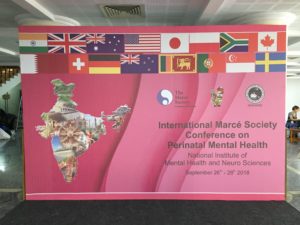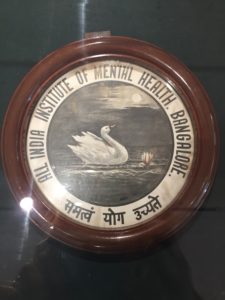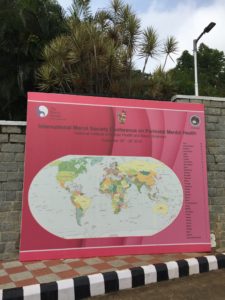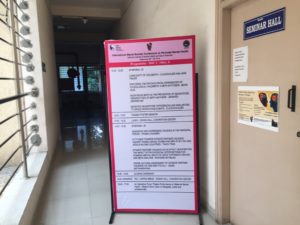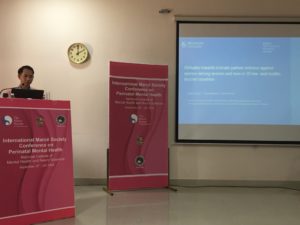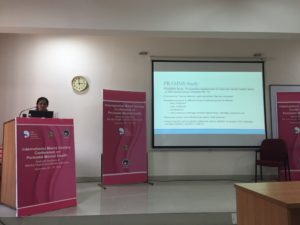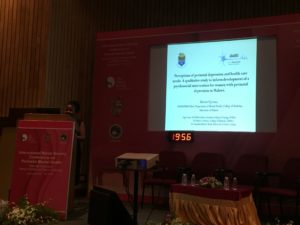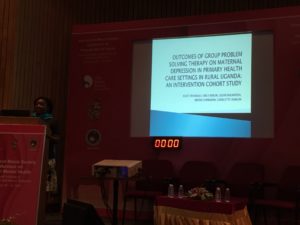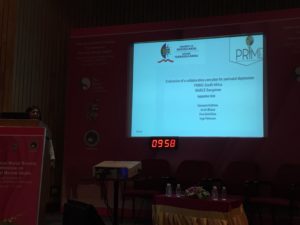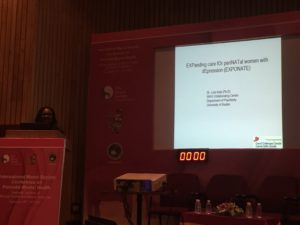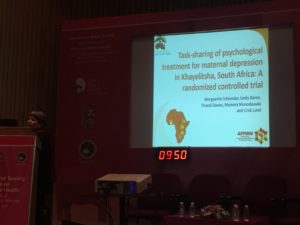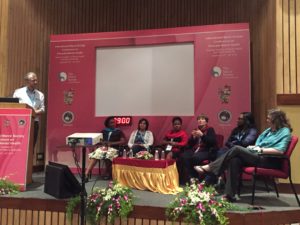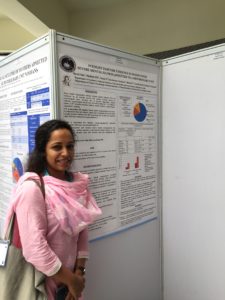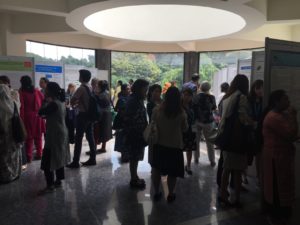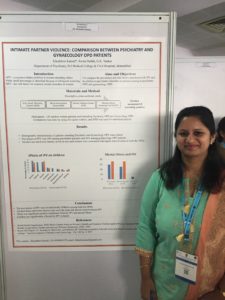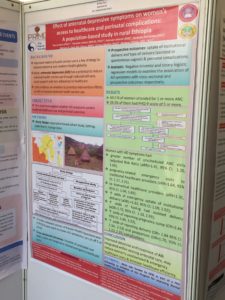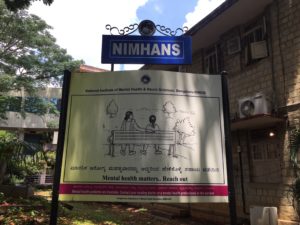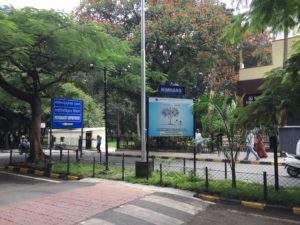EBMH published two papers on perinatal psychiatry in August 2018. Gordon & Wilson’s commentary on Rasmussen et al.’s (2017) population-based cohort study of postpartum affective disorders in women with no psychiatric history, discusses the risk of recurrence in future pregnancies. Tomelleri & Pariante’s expert commentary discusses three 2017 studies of child outcomes for women experiencing perinatal mental health problems and receiving medical treatment. They concluded that perinatal mental health requires greater attention and dedicated services.
The International Marcé Society’s biennial scientific meeting, held on 26-28th September 2018 at India’s famous National Institute of Mental Health and Neuro Sciences (NIMHANS) in Bengaluru, therefore came at an important time for the field. Plenaries and symposia spanned diverse research methodologies, from biomarkers of prenatal stress in utero and perinatal physical and mental health interventions from Japan, the US and Europe, to prevention, preconception and ethical obstetric care and self harm prevalence in low and middle-income countries. The content was truly multidisciplinary, with research presented from midwifery, nursing, psychology, medical and biomedical fields.
My own PhD will conduct a feasibility study of a perinatal psychosocial intervention adapted to address the prevalent stressor of intimate partner violence (IPV), in rural Ethiopia. I presented the preliminary results of my meta-analysis of whether exposure to IPV moderates women’s treatment response to psychosocial interventions for common mental disorders (CMDs) in a symposium convened by conference co-organiser Prabha Chandra, alongside Thach Tran and Veena Satyanarayana, on cross-cultural assessment of IPV. My research interests dictated the sessions which I attended, and the summary here demonstrates the breadth of research presented at this richly diverse meeting.
Highlights on 26th September included plenary sessions from Lakshmi Vijayakumar on suicide rates in the Global Burden of Disease study, and Atif Rahman on how global mental health research has dispelled myths about perinatal depression, and how it can be treated. A symposium chaired by Helen Sharp discussed insights, methodological questions and cross-cultural differences in mother-infant caregiving from the Indo-UK collaborative Bangalore child health development study. A symposium focused on peer-delivered perinatal interventions in India and Pakistan, with presentations from Daisy Singla, Revathi Krishna, Siham Sikander and Vikram Patel discussed implementation factors, such as confidentiality, in diverse settings, and mediators of treatment effects, including perceived support and behavioural activation. Finally, conference co-organiser and president of Marcé Jane Fisher chaired a symposium on universal approaches to preventive interventions, with examples from Australia and Vietnam.
After plenaries on 27th September by Evita Fernandez on obstetric ethics and Carmine Pariante on inflammation in pregnancy, the Global Alliance for Maternal Mental Health called for sharing of data about perinatal mental health services worldwide. Their symposium featured early career research presentations on perceptions of perinatal depression in Nigeria by Kike Olajide, prevalence of perinatal depression and self harm in Sri Lanka by Alexis Palfreyman and economic evaluations by Annette Bauer. The John Cox symposium on psychosocial interventions for maternal depression in sub-saharan Africa was chaired by Simone Honikman and Robert Stewart. It featured presentations from Mwawi Ng’oma on qualitative research in Malawi, problem-solving therapy in Uganda from Juliet Nakku, collaborative care in South Africa from Tasneem Kathree, depression treatment outcomes in Nigeria, and a task sharing intervention in South Africa from Marguerite Schneider. The diversity of global research presented from a range of resource and clinical settings demonstrated the vibrant activity within perinatal research today.
The final day, 28th September, began with medal presentations from Bryanne Barnett and Cindy-Lee Dennis, and a plenary focused on WHO and UNICEF’s 2018 nurturing care framework for early childhood development. A morning symposium considered the concept of intergenerational trauma, through research into biomarkers by Kieran O’Donnell and Carmine Pariante and interventions for parent survivors of childhood maltreatment by Maria Muzik and Jill Domoney. In the afternoon,Vivette Glover’s pioneering research in perinatal psychobiology was celebrated. Each day of the conference featured a lively poster presentation, including many studies by clinical academics from LMICs, including those by Shruti Nair, Khushboo Kansal and Tesera Bitew shown here.
Alongside this stimulating programme, a range of cultural, dance, theatrical, yoga, culinary and educational sessions were organised, making the most of a wonderful conference location, alongside tours of the leafy NIMHANS campus, which takes every opportunity to promote mental health and wellbeing, through signage and directions to access support. The many opportunities to meet early career researchers and clinical academics in this field (including opportunistic Über rides between hotels and NIMHANS) and hear about their work confirmed that the future of global perinatal mental healthcare and research is bright indeed.
My attendance at Marcé was generously supported by The Fran Trust, a King’s College London (KCL) conference grant, KCL’s health service and population research department and section of women’s mental health. Many thanks to them, my PhD supervisors, Dr Charlotte Hanlon and Professor Louise Howard, and my PhD funders, King’s College London and the KCL IoPPN Clinician Investigator Scholarship. For my #Marce2018 tweets, see @RoxanneKeynejad
